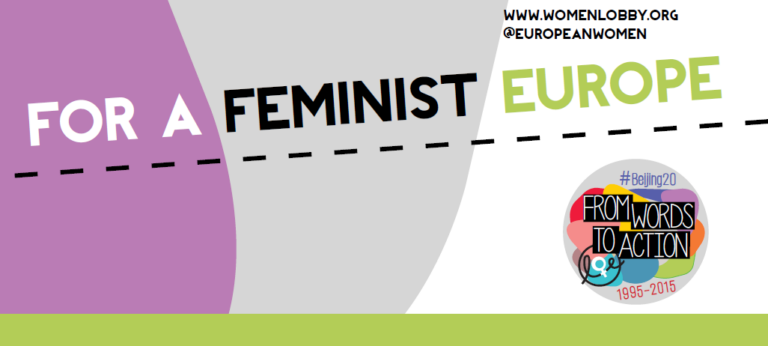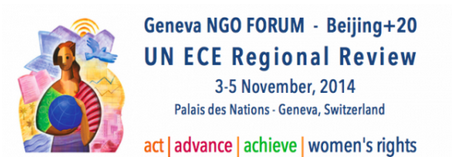[By Nathalie Margi, Economic and Social Rights Consultant with the Center for Women’s Global Leadership (CWGL)] The 58th session of the Commission on the Status of Women (CSW58) took place at the United Nations (UN) Headquarters in New York from 10 to 21 March 2014. This year was a particularly important one since the priority theme, “Challenges and achievements in the implementation of the Millennium Development Goals (MDGs) for women and girls,” reflected the intersections of the CSW with other concurrent global processes preparing for the review of the MDGs, which set 2015 as a target, and the design of a post-2015 development agenda.
Feminist and women’s rights organizations working on macro-economics, finance, and economic, social and cultural rights mobilized at the CSW to advocate for the inclusion of strong language in the Agreed Conclusions on creating a macro-economic environment that enables the realization of all human rights for women and girls worldwide.
Background: Our Demands
The current neo-liberal economic policies have promoted reduced government spending, deregulation, the privatization of public assets and services, and rampant unequal forms of trade liberalization, which has led to an increase in inequalities and has undermined the capacity of States to uphold human rights, in particular economic, social, and rights (ESCR). Women and girls, who comprise a majority of the world’s poor, are disproportionately affected by these policies. Even in times of economic crisis, States have an obligation – including extraterritorial obligations – to respect, protect, and fulfill all human rights, and to adhere to the principles of progressive realization, maximum available resources, non-retrogression, minimum essential levels/minimum core obligations, and non-discrimination and equality.
As the CSW58 Expert Group report concluded, “the prevailing neo-liberal economic model is incapable of supporting gender-equitable sustainable development.” A development agenda that responds to women’s needs and upholds their rights is impossible without an enabling global economic environment committed to the realization of economic, social, and cultural rights. Financing is fundamental to the realization of women’s human rights. Without public funds for social services and infrastructure, there will be no guarantee that women’s human rights will be supported. The public sector is therefore the cornerstone of a sustainable development financing strategy.
The ability of governments to use the resources they receive for sustainable development depends on the international finance, debt, trade, and tax framework. Therefore, the international trade and finance architecture requires fundamental, development-oriented, rights-based, structural reform that respects the principles of transparency, accountability, and participation. In addition, autonomous civil society organizations and social movements led by women and girls have been shown to have the most significant and sustainable impact on promoting, protecting and advancing the human rights of women and girls. Yet they remain grossly under-resourced. A significant and sustained increase in financial resources to these organizations and movements is indispensable to uphold women’s rights and achieve gender equality.
Challenges and Successes at CSW58
Feminist and women’s rights advocates from around the world mobilized for the inclusion of strong commitments in the CSW58 Agreed Conclusions on a global economic and financial framework that creates an enabling environment for the realization of all human rights for women and girls, including ESCR.
In this endeavor, we faced many obstacles. Some Member States displayed hypocrisy in evoking sovereignty to evade their human rights obligations while supporting or entering into agreements with corporations and other private actors that undermine their national sovereignty. Some also claimed that economic issues were not relevant to a conference on women’s issues. There were efforts to separate issues of concern to the Global North and the Global South. Finally, these issues were too seldom considered a priority for Member States and civil society organizations (CSOs), particularly in the Global North.
Despite these challenges, advocates working on macro-economic, finance, and related issues collaborated effectively to develop language proposals, lobby Member States, and strengthen the understanding of allies among Member States and CSOs on these issues and their capacity to advocate for them. Although some of the language included was weak, insufficient, or problematic, overall, we succeeded in ensuring that the Agreed Conclusions contained strong language recognizing the importance of a global economic and financial architecture that fosters an enabling environment for the realization of all human rights for women and girls. References to national sovereignty were not included in the text; on the contrary, several strong references to Member States’ international human rights obligations as well as to the universality and indivisibility of human rights were included.
Language in the Agreed Conclusions
The Agreed Conclusions contained strong language on the indivisibility and universality of human rights, including ESCR (paras 11, 41, (k), (ff)), access to, control and ownership of assets and resources (paras (k), (ggg)), the links between child health and women’s rights (para 22), gaps in the Millennium Development Goals (MDGs) (para 28), women and work, including care work (para 13, (k), (z), (gg)), macro-economic policy (para (ccc)), access to services and infrastructure (paras (dd) and (gg)), social protection (para (ff)), gender-responsive budgeting (paras (qq) and (bbb)), Overseas Development Assistance (ODA) (para 38), and the need to recognize the achievements and increase the resources of feminist groups (paras 40 and (ddd)).
Some of the paragraphs on women and work, including care work (paras 13, 19, 21), included strong language on women’s full and productive employment, decent work, over-representation in low paid jobs and gender-stereotyped jobs like domestic and care work, and the lack of equal pay for equal work or work of equal value, as well as the unequal burden of unpaid care work and insufficient measures to reconcile paid work and care responsibilities, and insufficient social protection and insurance coverage for women. However, they fell short of highlighting the need to transform macro-economic structures and to recognize care work as not only a shared but also a collective social responsibility.
Paragraphs on human rights, including ESCR (paras 11, 25, 32, 41, (aa)) included strong language on the universality and indivisibility of human rights but failed to mention States’ extraterritorial obligations, which are indispensable to holding non-state actors accountable for human rights abuses. Strong language was included on the right to water and sanitation and disproportionate effects on women and girls, but again, the document failed to make a concrete link between macro-economic policies that invest in infrastructure and social services and the realization of all of women’s and girls’ human rights. The text also mentioned women’s and girls’ inheritance rights and access to and control over resources but was weak on land and other productive resources, failing to clarify that the equal right to own and lease land is not the same thing as the equal right to land. Further, the text lacked language on growing inequality both within and between countries and its implications for the realization of human rights, as well as language on the unsustainability of growth.
The Agreed Conclusions mentioned development financing and international cooperation (paras 26, (uu), (ww), (yy), (zz), but failed to acknowledge the need for a shift from problematic global economic structures and for common, but differentiated responsibilities of states in this matter agreed upon in the Rio Declaration on Environment and Development (Principle 7) and reaffirmed in the Rio+20 outcome document (para 15)). The document contained problematic language on public-private partnerships and on voluntary innovative financing mechanisms, which failed to recognize non-state actors as duty-bearers that must be held accountable for their human rights obligations. Although States’ Overseas Development Assistance (ODA) commitments were reiterated (based on CSW52 ACs (2008), para 21(q) and reaffirmed by G77 and China in China’s statement at the Special High Level Meeting of ECOSOC with the Bretton Woods Institutions, the WTO, and the UNCTAD (22 April 2013)) the document merely “urged” States to “make concrete efforts towards” meeting ODA targets, which fell short of holding them accountable for fulfill their commitments.
Paragraphs on global economic, trade, and financial reform (paras 35, (jj), (mm), (nn), (oo), (pp), (rr), (jjj)) included strong language on the adverse impacts of the world financial and economic crisis, risks for women and girls, and the need to reform and strengthen the international financial system in order to create an enabling environment for the realization of women’s and girls’ human rights. However, they were insufficiently critical of current structures and failed to identify the root causes of the crisis, such as deregulation, fiscal policy, inflation targeting, and uncontrolled capital mobility. Although they comprised positive language on strengthening women’s participation and contributions in decision-making processes, improving their access to services, and expanding their opportunities, they failed to acknowledge the problematic aspects of trade, markets, and economic growth and efficiency, as well as the links between military and social spending. Finally, the document included strong language on increasing funding for women’s rights, including for women’s rights organizations (para (ddd)), but it fell short of making the link between these funds and the need for progressive taxation and human rights based macro-economic policies.
In short, although the Agreed Conclusions didn’t go far enough in detailing the shortcomings of current global economic and governance structures and in formulating concrete recommendations for reforming them, they provided strong agreed language on the importance of a global economic and financial architecture that fosters an enabling environment for the realization of all human rights for women and girls and an inclusive, sustainable, and equitable post-2015 development agenda.
By Nathalie Margi, Economic and Social Rights Consultant with the Center for Women’s Global Leadership (CWGL). The author extends warm thanks to colleagues at CWGL and at other organizations who collaborated on macro-economic and related issues at CSW58, including ActionAid, Asia Pacific Forum on Women, Law and Development (APWLD), Association for Women’s Rights in Development (AWID), Development Alternatives with Women for a New Era (DAWN), GESTOS, and Mama Cash.



